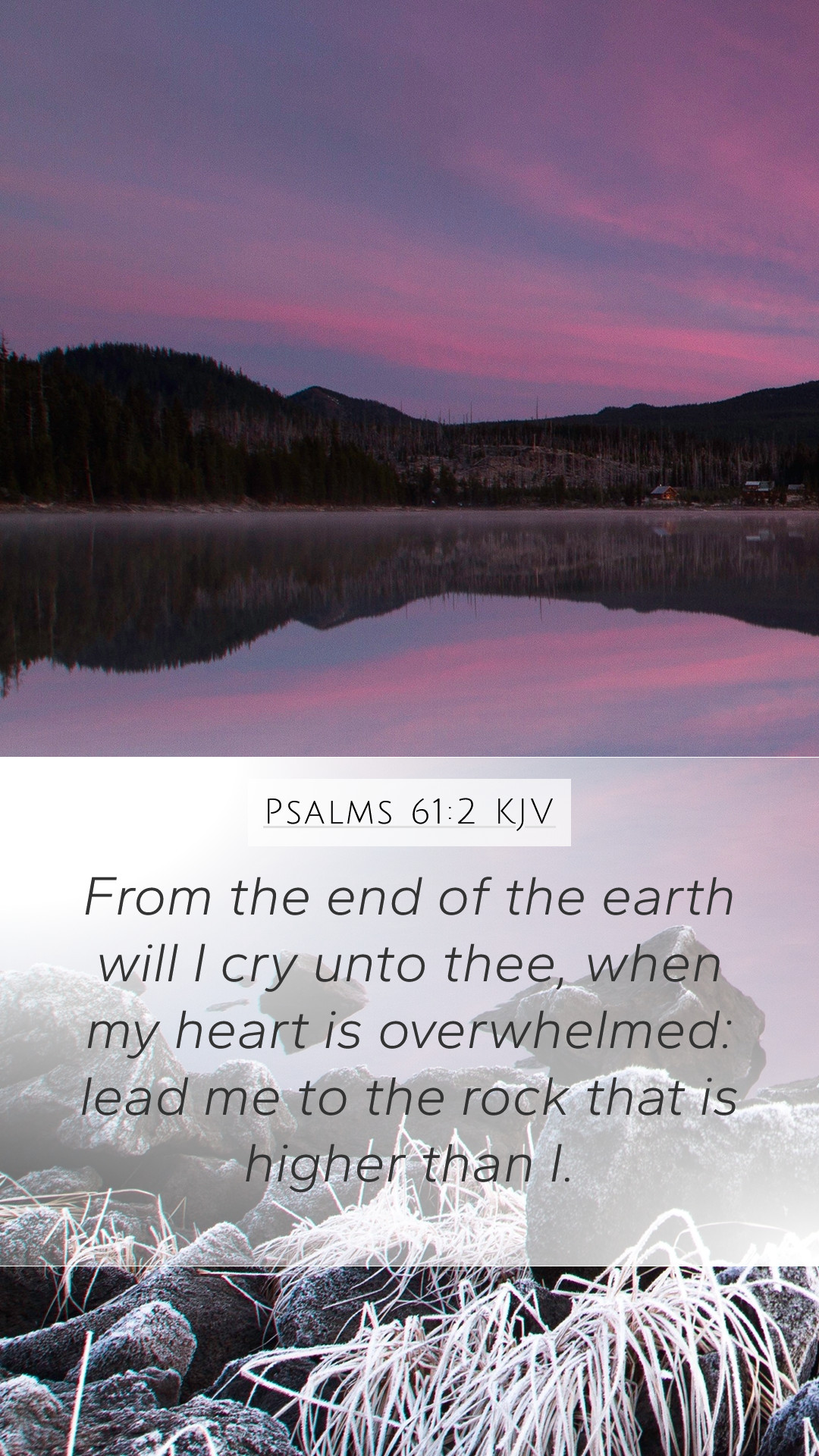Psalms 61:2 - Meaning and Commentary
Psalms 61:2: "From the end of the earth will I cry unto thee, when my heart is overwhelmed: lead me to the rock that is higher than I."
Overview
This verse conveys a deep sense of seeking God during times of distress. It illustrates a journey from a place of despair to seeking refuge and guidance from the Lord. The imagery of a "rock that is higher" emphasizes stability, protection, and a place of safety that can only be found in God.
Insights from Public Domain Commentaries
Matthew Henry's Commentary
Henry highlights the cry of the psalmist as one who feels distant and overwhelmed, alluding to the emotional turmoil faced in life’s challenges. He interprets the "end of the earth" as a metaphor for desperate situations, where the psalmist feels far from God's comfort. The "rock that is higher" symbolizes an elevated refuge from life's storms, underscoring God's supremacy and strength, which far surpasses our troubles.
Albert Barnes' Notes on the Bible
Barnes elaborates on the concept of crying out from the "end of the earth," indicating the feelings of isolation and helplessness. He emphasizes that in overwhelming situations, turning to God is paramount. The idea of being led "to the rock" suggests a plea for divine guidance, highlighting our reliance on God's direction. This also represents a prayer for elevation from despair, restoration, and a foundation for hope.
Adam Clarke's Commentary
Clarke points out the importance of sincerity in prayer, stressing that the heart's condition must be acknowledged in moments of despair. His interpretation recognizes the "rock" as Christ, who is our spiritual foundation. Clarke suggests that this verse serves as a reminder of the fundamental need for divine intervention and support in our lives when we are overwhelmed by emotions or circumstances.
Meaning of Bible Verses
This verse serves as a multi-faceted meditation on the human spirit's vulnerability and the unwavering nature of God's help. The remarkable appeal from the psalmist expresses a universal truth of relying on God during life's challenges. Through this scripture, we are invited to reflect on our own struggles and seek the steadfast guidance that only faith in God can provide.
Application of Psalms 61:2
Understanding this scripture encourages individuals to bring their burdens before God. This teaching is especially meaningful in today's society, where people often feel overwhelmed by life's demands.
Practical Steps for Application
- Prayer: Engage in sincere prayer, expressing your honest feelings to God.
- Reflection: Consider moments when you felt distant from God and how you can draw closer to Him.
- Bible Study Groups: Discuss this verse in community settings to gain diverse insights.
- Journaling: Keep a journal of prayers and experiences when you felt God as your "rock."
- Service: Support others who feel overwhelmed, reflecting the comfort you have received from God.
Cross References
- Psalm 18:2: "The LORD is my rock, and my fortress, and my deliverer."
- Psalm 46:1: "God is our refuge and strength, a very present help in trouble."
- Isaiah 26:3: "Thou wilt keep him in perfect peace, whose mind is stayed on thee."
Conclusion
The exploration of Psalms 61:2 through various commentaries allows for a deeper understanding of its significance in both historical and personal contexts. The psalmist’s cry for help embodies the struggles many face today, reminding us of the importance of seeking solace in God who provides stability and hope against life's adversities.
Further Study Resources
For those interested in Bible study, consider utilizing the following resources:
- Bible Study Guides - Helpful tools to analyze scripture.
- Online Bible Study Courses - Enhance your understanding through structured learning.
- Bible Commentary Products - Deepen your insights into scripture.


